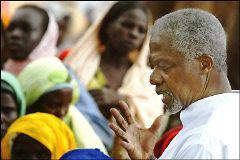UN deadline for Sudan to improve security ends Monday
DOW JONES NEWSWIRES
AL-FASHER, Sudan, Aug 30, 2004 (AP) — A senior U.S. State Dept. official toured a Darfur refugee camp Monday, assessing conditions for thousands of displaced people as a U.N. deadline for the Sudanese government to end violence in the troubled western region is set to expire.
 Constance Berry Newman, assistant secretary of state for African affairs, was briefed by aid agencies and U.N. officials before touring Abu Shouk camp, home to some 43,000 villagers driven from their homes in 18 months of fighting between government troops and rebels.
Constance Berry Newman, assistant secretary of state for African affairs, was briefed by aid agencies and U.N. officials before touring Abu Shouk camp, home to some 43,000 villagers driven from their homes in 18 months of fighting between government troops and rebels.
Children clamored around her as she visited one of 200 classrooms in the camp, where children sitting in the shade on mats learned about basic sanitation and the importance of clean drinking water.
Newman’s visit comes on the final day of the U.N.’s 30-day deadline for Sudan ‘s government to rein in Arab militiamen, known as Janjaweed, blamed for killing thousands of black African farmers and driving them from their homes.
The U.N., which sent three fact-finding teams last week to assess conditions in Darfur, is scheduled to issue a report Tuesday. The Security Council will meet Sept. 2 and consider whether to follow through with their threat of unspecified action against Khartoum.
Sudan ‘s foreign minister said Monday he hopes for a “reasonable decision” from the U.N. Security Council.
“Of course we are concerned,” Mustafa Osman Ismail told Associated Press Television in Khartoum, the capital. “We wish … the relationship with the Security Council will not be the way of confrontation. We hope it will be in the form of cooperation.”
The U.S., which sent Secretary of State Colin Powell to Darfur in July, has advocated sanctions against Sudan .
More than 30,000 people are thought to have been killed in the violence since two rebel factions took up arms against the government in February 2003 – escalating years of low-level conflict between African farmers and Arab herders, competing for water and land.
The rebels, drawn from African tribes, rose up against the Arab dominated government, claiming discrimination and political marginalization.
Human rights groups, the U.S. Congress and U.N. officials accuse the government of trying to crush the rebellion by backing the Janjaweed -allegations Khartoum repeatedly denies.
Efforts to forge peace between rebels and the government at talks in Abuja, Nigeria, have so far proved fruitless, with each side accusing the other of violating an April 8 cease-fire.
The peace talks mediated by the African Union continue Monday, reports the BBC on its Web site.
Only 30 kilometers from Al-Fasher, the small mud and straw hut village of Um Hashab lies in ruins and abandoned after fighting between government forces and rebels. Villagers told The Associated Press they were attacked Thursday by Sudanese troops who dropped bombs from helicopters.
The African Union, which has a team of 80 cease-fire observers, protected by 150 Rwandan troops, said it was investigating the claims. A contingent of 150 Nigerian soldiers was scheduled to arrive in Al-Fasher later Monday to boost the AU presence.
